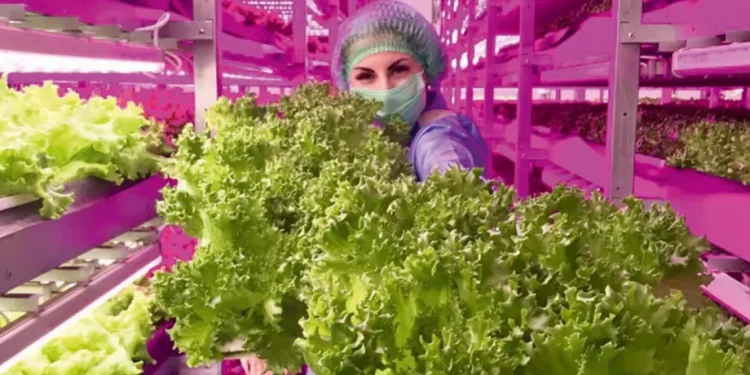Agricultural Technologies of the Future (brand “EcoFuture”) in Khabarovsk has pioneered Russia’s first large-scale vertical hydroponic farm, providing fresh greens to the Far East year-round. This state-of-the-art facility uses advanced PFAL technology to ensure consistent, high-quality production, showcasing a sustainable model for the future of agriculture.
Agricultural Technologies of the Future (brand “EcoFuture”), located in Khabarovsk, has established itself as a trailblazer in Russian agriculture by implementing the country’s first commercial-scale vertical hydroponic farm using Plant Factory with Artificial Lighting (PFAL) technology. Since its inception in 2016, this innovative approach has continuously supplied the residents of the Russian Far East with fresh greens, overcoming the region’s challenging climate conditions.
Inspired by vertical farming systems observed in the United States and refined with Japanese conveyor hydroponic technology, the enterprise has undergone significant adaptation to suit Russian conditions. “From the moment we launched the plant, we experimented extensively—fine-tuning technological solutions, growing regimes, production control systems, and seed selections,” explained Evgenia Maryinskaya, the operations manager. “Our facility now delivers a consistently high yield of quality and safe products year-round, which is crucial for the Far East’s harsh climate.”
The production operates on a conveyor principle, with most systems utilizing a closed-loop cycle that conserves water and optimizes energy use. The controlled environment fosters optimal growing conditions and facilitates process automation. Key aspects such as plant nutrition, light and temperature regimes, and CO2 levels are meticulously managed by an integrated control system. This ensures the production of ultra-fresh, pesticide-free greens that require no chemical treatments, allowing consumers to enjoy salads straight from the package without washing.
“We supply leafy salads and aromatic herbs across the entire Far East, collaborating with all major retail chains and focusing significantly on the HoReCa sector,” said Maryinskaya. “Currently, we cultivate 5-6 types of lettuce, arugula, basil, chard, and 6-8 varieties of microgreens. Our selection is driven by market demand, and we maintain close communication with chefs. Sometimes we respond to established demand, as with arugula. In other cases, our initiatives, like introducing Frillice lettuce to the Far East, create new market trends.”
The facility employs 20 people and produces 16 tons of fresh greens per month. The focus on product quality, year-round operational stability, and swift delivery has made EcoFuture’s greens distinctive in appearance and flavor. “Our greens are recognizable even on a plate in a cafe—they are unmistakable,” added Maryinskaya. “Our products save resources as customers do not need to spend time and effort on cleaning and waste disposal—everything purchased can be used immediately.”
In addition to its primary production, the enterprise runs an experimental laboratory that tests new varieties and methods. Maryinskaya is optimistic about the future, stating, “We believe that vertical farming technologies can significantly contribute to supplying city dwellers with high-quality fresh vegetables and greens.”
The success of Agricultural Technologies of the Future in Khabarovsk demonstrates the viability and benefits of vertical hydroponic farming in providing fresh, high-quality produce regardless of climatic challenges. By leveraging advanced PFAL technology, the enterprise not only meets local demand but also sets a sustainable precedent for future agricultural practices in urban settings.











